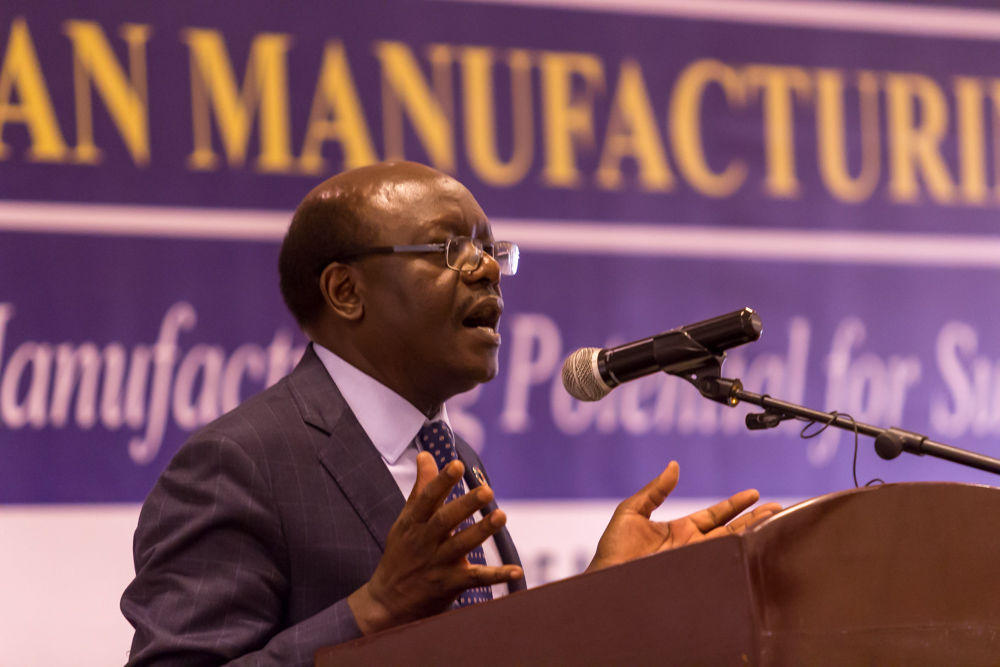
2nd East African Business Manufacturing Summit and Exhibition kicks off in Kigali
East African Community Secretariat; Kigali, Rwanda; 24 May 2017:
The Prime Minister of the Republic of Rwanda, Rt. Hon Anastase Murekezi said the EAC Member States, need to continue working as one team by harmonising policies that will boost the manufacturing sector in the region.
Rt. Hon Murekezi who was the chief guest at the official opening of the 2nd East African Manufacturing Business Summit and Exhibition (EAMBS 2017) at the Serena Hotel in Kigali, Rwanda said ‘’The Collective action and harmonised policies will help the region to manage the consequences of economic growth as we work to stimulate the manufacturing sector”.
He disclosed to the summit that to date, the average contribution of the manufacturing sector to GDP of EAC is about 10%. It is planned that this contribution will reach 25% by 2032. It is also expected that by the same year 2032, EAC will have diversified the manufacturing base and raised the value of the local content of manufactured exports to at least 40% from the currently estimated value of 8%.
To be able to achieve these targets, EAC must focus on full implementation of the Common Market Protocol as well as on value addition for export products. Therefore, the EAC Industrialization Strategy and its Action Plan cannot simply be shelved documents. They must guide all our policy actions and deliver results, said Prime Minister
The Prime Minister also urged the region to promote Intra- African Trade by deepening Africa’s market Integration and significantly increasing the volumes of trade that African Countries undertake among themselves. ‘’As EAC Partner States, we should embrace the COMESA, EAC and SADC Tripartite Agenda which will open up a much wider market for our goods’’
Rt. Hon Murekezi reiterated the importance of the Private Sector as the engine of the transformation in manufacturing sector and called for all participants attending 2nd East African Manufacturing and Business Summit to use their experience and skills to advise EAC on how our region can better engage with the Private Sector to leverage higher levels of investment in manufacturing.
In his part, Rwanda Minister of Trade, Industry and EAC Affairs, Hon François Kanimba informed the participants that EAC Industrialisation Policy provide an avenue to promote the competitiveness of the modern industrial sector by placing strength on diversifying manufacturing base, improving capacity, developing a strong Small and Medium Enterprises (SME) manufacturing sector and boosting exports of manufactured goods.
“I believe that this is the right time for stronger partnerships to be forged amongst various partners especially among the public and private sectors and member states but also the EAC and our fellow Regional Economic Communities. Let us therefore seize this moment and translate the political will prevailing in the EAC region into tangible results. ‘’
Addressing the same occasion, the EAC Secretary General, Amb Liberat Mfumukeko said that the region have the geographical and comparative advantage in terms of resource endowments in form of minerals, oils, gases and agricultural commodities, which are the key ingredients for manufacturing. We are also creating competitive advantage by developing infrastructure i.e. our road network; railway network; sea and lake ports; air transport and Information and Communications Technology, added Amb Mfumukeko.
The Secretary General called for private sector to steadfastly work with the government of EAC Partner States to identify industrial sectors where targeted support is required so as to unlock their growth and developmental potential. He urged the Partner States government to be keen in creating enabling environment for competitive investment in the region.
The Secretary-General of the United Nations Conference on Trade and Development (UNCTAD), Dr Mukhisa Kituyi, called for sustainable investment in an integrated manner in the region and noted that EAC was the gateway for Africa. Dr Kituyi said the region needs to model itself to the realities of the market; otherwise it will be left behind on the global market.
The Executive Director of the East African Business Council Ms. Lilian Awinja said for the region to become a middle income economy, or even to achieve Industrialization by year 2032, the manufacturing sector should be given the due attention it deserves, in terms of setting up a conducive environment for the manufacturing sector to continue to grow, prosper and become competitive within and outside the region.
She called for the EAC region to formulate Regional Local Content Policy with the aim of boosting the domestic value-add in the region.
Over 300 top executives in the manufacturing and agri-business sectors, high-ranking policy and decision makers, as well as leading financial institutions from Africa and beyond are participating in the 2nd East African Manufacturing Business Summit and Exhibition themed ‘’Harnessing the Manufacturing Potential for Sustainable Economic Growth in East Africa ‘’
The EAMBS 2017 is being organized by the EAC Secretariat in collaboration with the East African Business Council, the host Government of Rwanda and other EAC Partner States with the support of Development Partners.
- ENDS -
For more information, please contact:
Mr Owora Richard Othieno
Head, Corporate Communications and Public Affairs Department
EAC Secretariat
Arusha, Tanzania
Tel: +255 784 835021
Email: OOthieno [at] eachq.org
About the East African Community Secretariat:
The East African Community (EAC) is a regional intergovernmental organisation of five Partner States, comprising Burundi, Kenya, Rwanda, Tanzania and Uganda, with its headquarters in Arusha, Tanzania.
